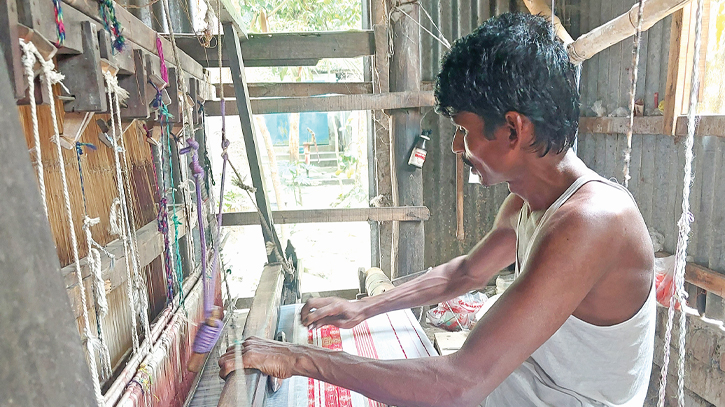
A handloom worker in Tangail town is seen busy weaving traditional ’jamdani sari’ ahead of the Eid al-Fitr celebration. Photo: Messenger
Tangail's saree artisans are currently immersed in crafting vibrant sarees in anticipation of the upcoming Eid celebrations this month. Renowned for their exquisite craftsmanship, the sarees woven by local handloom weavers are highly sought after by buyers nationwide.
Currently, the market for power loom sarees has experienced a notable surge in demand and sales, coinciding with a decline in the value of handloom sarees.
The decline in handloom saree sales is attributed to the rising cost of raw materials and the high price of the sarees, which has led to a decrease in demand. This has, in turn, contributed to a reduction in the number of handloom factories and the closure of businesses owned by weavers.
However, there is a glimmer of hope as weavers anticipate selling sarees worth Tk 3-4 thousand crore during the upcoming Eid and Boishakh festivals. Traders are optimistic about recovering from previous losses, citing the normalization of the country's political climate after the pandemic and before Eid.
Despite these positive signs, weavers have reported a decrease in saree production due to lower sales compared to last year. This has resulted in a reduction in the number of sarees workers can produce per month, from 15 to 7-10. In the handloom village of Delduar in Tangail, known for its vibrant sarees, weavers are busy at work, even as the Eid festivities approach. The sound of handlooms fills the air, along with the rhythmic clacking of shuttles and threads. Despite the beauty of their craft, weavers and traders alike are struggling to keep up with the demands of the market, as the low demand for sarees has limited the work available for both weavers and thread makers.
Tangail sarees, which are exported to India, have seen an increase in demand, but the wages of weavers have not kept pace. This has led to a labor shortage, with weavers calling for an increase in wages to meet their daily expenses. Sarees are produced not only in Tangail but also in various other regions, contributing to the local economy.
Handloom artisans have expressed concerns about the rising cost of raw materials and the decrease in wages, making it increasingly difficult to sustain their families. Kamal Rajbongshi, a handloom artisan, highlighted the challenges faced by weavers, including a lack of work and low wages. Weaver Mubarak shared his experience, stating that he has had to reduce his production from 25 sarees to 15 due to the lack of demand.
Despite these challenges, there is a sense of optimism among saree traders and weavers. Opu Chandra Basak, proprietor of Moni Traders in Patharail Bazar, noted an increase in saree sales, and Raghunath Basak, president of the district saree traders, expressed hope for the future of the industry. Palash Chandra Basak, director of the Tangail Chamber of Commerce and Industry, emphasized the need for government support to sustain the handloom industry, which is facing stiff competition from power loom sarees.
While the handloom industry in Tangail faces significant challenges, there is a possibility of recovery during the upcoming Eid and Boishakh festivals. The export of Tangail sarees to India offers a glimmer of hope, but the industry requires government support to survive in the long term.
Messenger/Faria








